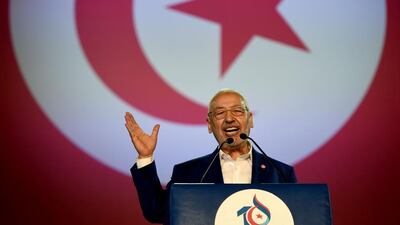On the eve of a three-day Ennahda party congress in Tunisia, the French daily Le Monde published an interview with the party's leader Rachid Ghannouchi. In it he declared that Ennahda was changing its stripes, from a strictly Islamist party to a more moderate one.
“Tunisia is now a democracy. The 2014 constitution has imposed limits on extreme secularism and extreme religion,” he said. “We want religious activity to be completely independent from political activity.”
He explained that the shift would be beneficial to politicians as they would no longer be accused of exploiting religion for political purposes. At the same time, religion would be freed from the yoke of politics.
Leaving no room for doubt, Mr Ghannouchi, who was re-elected this week as the head of Ennahda, which is part of Tunisia’s governing coalition, explicitly said: “We are leaving political Islam and entering democratic Islam. We are Muslim democrats who no longer claim to represent political Islam.”
The Saudi columnist Tariq Al Homayed wrote in the London-based daily Asharq Al Awsat: "This is Mr Ghannouchi's point of view and position at the moment, but can it be interpreted as an apology for decades of interference by the Muslim Brotherhood in our region under the guise of religion for purely political purposes?
“Or has he finally reached the conclusion that there is no hope for political Islam on the Arab and international scenes, and that this in fact is the beginning of its demise?”
Denouncement of political Islam movements has been particularly resounding following the Arab Spring.
Political parties that have been operating under the cover of Islam have lost all credibility, despite the ill-placed support they have received from the West, especially from the Obama administration in the United States, which believed that political Islam would usher in an era of democracy and reform.
Mr Ghannouchi’s latest statements make way for a serious discussion in this region about the harms of political Islam, the writer said. This would allow for a large-scale campaign to attempt to rectify outdated concepts that were entrenched in the minds of generations of Arabs.
For his part, the columnist Amin Kamourieh wrote in the Lebanese daily Annahar: "Ghannouchi did well to remove the cloak of the Muslim Brotherhood, which his party has donned since the beginning, opting for the cloak of a civilian political party that separates faith and politics. Experience has shown that mixing politics with religion has ended in violence and terrorism in our Arab region."
This isn’t the first time that the leader of Ennahda has defied expectations. His party willingly gave up power in Tunisia and entered into a coalition to save the country from turmoil. This was because it saw what the Brotherhood’s monopoly of power had led to in Egypt.
“His rational position may have saved Tunisia from the fate of Libya and Algeria,” the writer said. “The man is a rare figure on the political Islam scene.”
This turn of events would not go unnoticed, Kamourieh said. Some Islamists would interpret it as a regression from religion or even an attempt to appease the West. Secularists would also be sceptical, as they would see it as a manoeuvre aimed at political and electoral objectives.
Mr Ghannouchi will need time to prove how serious he is, for a shift of this kind gives rise to profound questions.
Has he finally realised that the way of political Islam was wrong? Can you separate religion from politics? Can his move be seen as an ideological divorce from the Muslim Brotherhood or is it simply a repositioning aimed at acquitting Ennahda from the political and security crisis in Tunisia?
* Racha Makarem
rmakarem@thenational.ae

